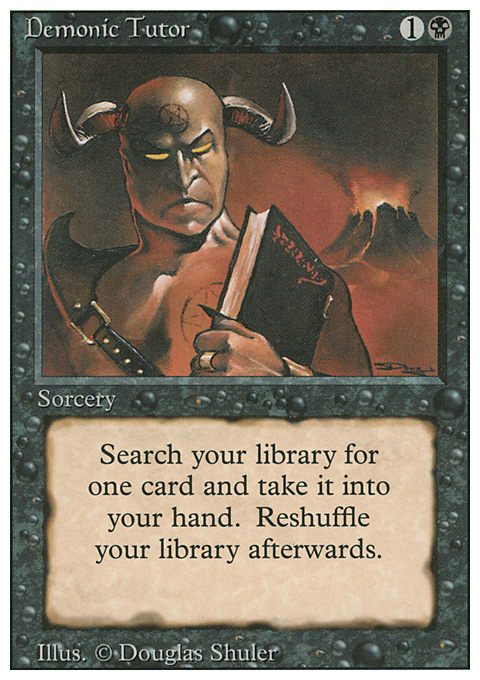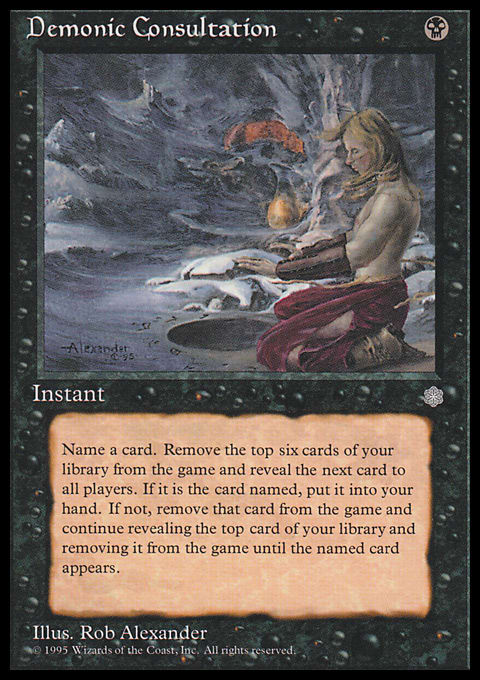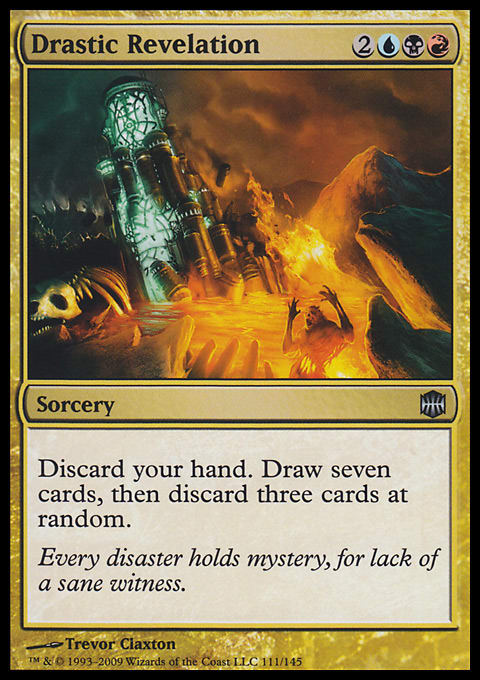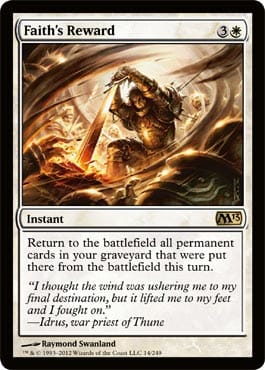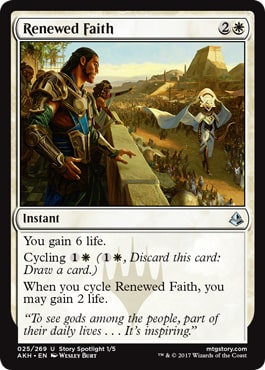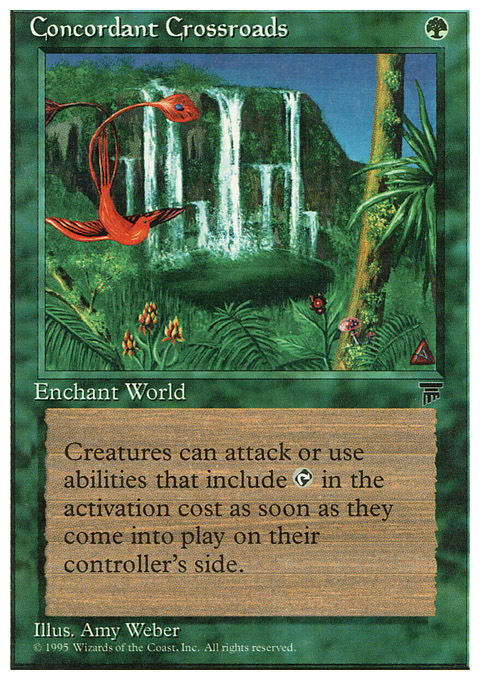As Born of the Gods makes its way into players’ hands, I can’t help but think about the fact that Magic has created a God creature type. Literally, players can now say to each other, “I just cracked a God in this booster.” How wild is that?
Born of the Gods and the rest of the Theros block takes its story and flavor cues from Greek mythology. In Greek mythology the gods were often among mortals, cavorting, warring, and sometimes having babies. But being “born of a god” isn’t unique to Greek mythology. Other religions claim to have someone of divine origin within their history, too.
For me, beliefs about how the divine meets humanity have been entwined with playing Magic since day one. In the paragraphs that follow, I’ll tell you the story about how Magic has intersected with my faith so far. I hope that by the end of this article you’ll be asking yourself this question: How does Magic cross paths with my faith (or lack thereof), and what am I going to do about it?
Genesis
I was raised in a family that did not accept Magic. At some point in junior high, I was told to avoid the game. “It’s demonic,” was the reason given. Somehow, my parents knew the game involved casting spells, which was considered pagan. It was implied that to even pretend to cast spells would be sinful.
In addition to this, the images on the cards were considered reprehensible, either because of violence or nudity and sexuality. They were not to be looked at and certainly not to be brought into our home. Again, it was implied that these restrictions had to do with our family’s religious views—specifically, our views about God.
I was generally a good kid and so I abided by my parents’ rules. I remember being given a sampler pack of Seventh Edition by a friend. It contained one basic land of each color and one common card from each color (Gorilla Chieftain and Lava Axe were two of the cards I remember). I kept it in my room, secretly hidden under a few books on my bookshelf. I knew that I shouldn’t have them, but I wasn’t willing to throw them out for at least a weak. I was fascinated by the pictures, the mana symbols, the colors, and everything I’d heard at school about how cool the game was.
I eventually threw out the cards. I knew they weren’t allowed, and I didn’t want to be caught with them. My parents never knew.
CCGs on the Rise
By the time I entered high school, the customizable-card-game fad was in its zenith. I was completely absorbed by OverPower, a game featuring the best of Marvel, DC, and Image Comics characters, and Decipher’s original Star Wars: the Customizable Card Game.
I spent whole weekends playing these games. From the time school ended Friday, through Saturday, and on until Sunday morning (when we went to church), I would play these and other games. (Our other favorites at the time included the X-Men card game by Wizards of the Coast and Fleer’s Young Jedi.)
I didn’t really think about Magic much at all during this time period. I knew it was a big game because it seemed that every issue of Scrye was dominated by it. But I didn’t feel that I was missing out on anything. My group of friends was so committed to OverPower and comic books that we weren’t really aware of Magic’s popularity or of the fact that it was (and is) the groundbreaking customizable card game.
Revelation
It was when I entered college that things started to change . . . I started to ask questions about God and the implications of belief in God for my life. It struck me that I was living with some double-standards—especially when it came to games. For example . . .
OverPower – It’s a game that celebrates this ideal: might makes right. The object of the game is to crush the opponent by pitting your biggest bruisers against his. Let the mayhem begin. This is not exactly a morally-redeemable ideal, nor is it really that different than violent Magic cards. Not to mention the sexuality inherent in superhero and superheroine images. I eventually realized the images in OverPower were neither better nor worse than those found in Magic.
Star Wars – It’s everyone’s favorite trilogy, right? Who didn’t grow up watching these films? Who didn’t buy all the toys, wear the t-shirts, and dress up like Jedi on Halloween? Never mind that the stories borrow Buddhist concepts (my family isn’t Buddhist, and to have celebrated Buddhism at home would’ve caused problems). Never mind that “Lord” Vader wants you to “give in to the dark side” because “it is the only way.” According to the standards of what was considered “demonic” in my religious tradition, I had to ask myself, how come Star Wars was given a free pass?
Onward and Upward
I bought my first Magic starter deck four years ago on a whim. A friend and I were chatting about our love for games of all kinds, and it came up that neither of us had ever played Magic. So I got a Zendikar starter deck (even then, I made sure to buy the white one because I thought it would be “cleaner” than the black one) and began a hobby that I’ve thoroughly enjoyed ever since.
How have things changed? Why play Magic now? Do you still believe in God? Shouldn’t it be “against my religion?”
For me, one of the results of asking questions about God in college is a deeper faith. I’m more intentional about caring for my soul and seeking God now than I’ve ever been. I’ve become uncomfortable accepting religious traditions without doing my own research. I’m also trying to view all of my activities in the world through the lens of eternity. More than ever, I’ve come to believe that the things we do ¬matter—even our hobbies. If I’ve learned anything about faith in recent years, it’s that I should celebrate what’s good in all things and try to redeem what’s bad in all things.
Magic is a hobby worth celebrating. It’s a complex problem-solving and mathematics challenge bundled up in a “simple” card game. It’s also story—and lots of it—that is rich in positive, even faith-infused, redemptive ideas. On top of that, it features mind-bending images of far-off worlds. But even more than cognitive exercises or escapist fantasy, it’s a social game. It’s a game that brings me together with a handful of other people for hours of laughter and friendly competition.
I still have faith in God. And lest you think my parents are hyper-conservative cult members, let me tell you that they’re two of the brightest, kindest people you’ll ever meet, who couldn’t care less that I play Magic. And once more in their defense, now that I’m a dad myself, I too have felt tension about which kinds of content I am willing to let my son be exposed to. As of this writing, he is four years old. I’ve let him play with a lot of my cards before (he likes to look at the mana symbols the most, especially on the white-bordered cards), but I’ve intentionally kept my Vampire Outcasts out of his sight. When he’s ready to process the image on that card with maturity, I’ll let him see it. Until then, anything that so blatantly pairs sexuality and violence will be kept away from his four-year-old eyes. (I’m talking about you, Bloodcrazed Neonate and Crossway Vampire.) He’s not ready for that yet. I’m learning decisions like this are just a part of parenting.
Standing at Concordant Crossroads
Have your religious beliefs and Magic ever intersected? How so? I’d love to read your story below.
Magic is a game that draws on the Christian faith (Swords to Plowshares, Dust to Dust, and numerous others), Druidism (Citanul Druid, Devoted Druid, and a bazillion more), Islam (Jihad, Piety, and others), east Asian religions (the Kamigawa block and more), Greek mythology (the Theros block and others), and whatever I’ve undoubtedly forgotten. Has there ever been a card that you’ve come across that has made you stop and think about something spiritual or religious? Have you ever done anything about it?
Are you an atheist? In light of your atheism, what role does Magic play in your life? I’d love to hear about it.
Tell me your faith and Magic story. I’d love to read it.














